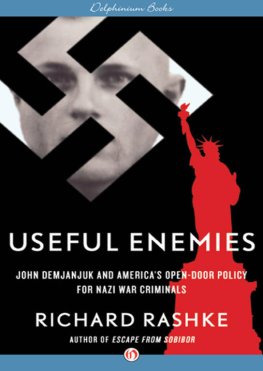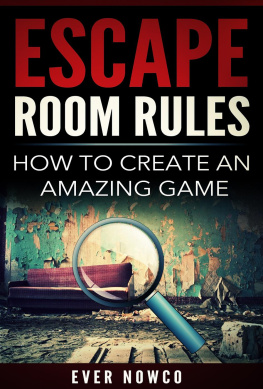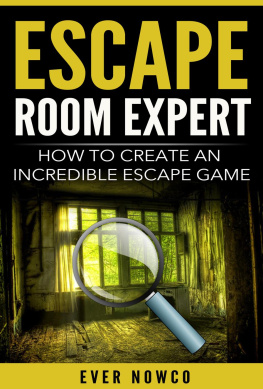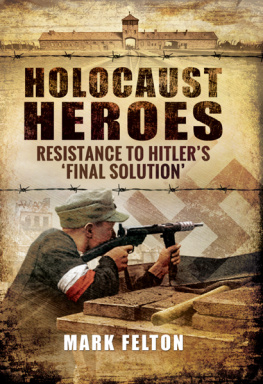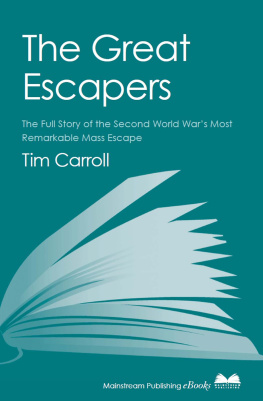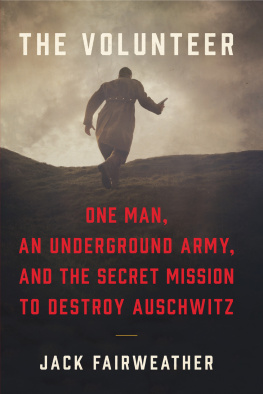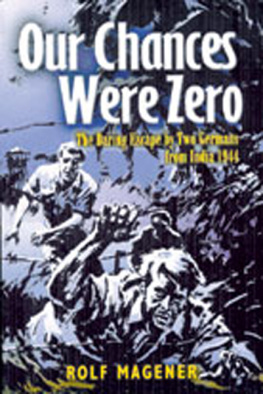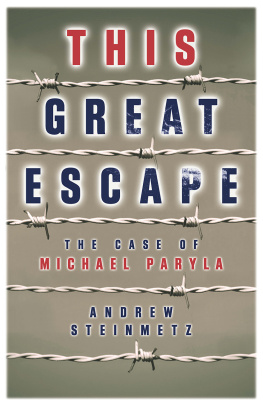Escape From Sobibor
Richard Rashke
Updated Edition

ALSO BY RICHARD RASHKE
The Killing of Karen Silkwood
Capitol Hill in Black and White/with Robert Parker
Dear Esther
Pius
Useful Enemies (January 2013)
Contents
for
the more than two hundred and fifty thousand who did not escape from Sobibor
to
Guy
Introduction
ALMOST EVERYONE KNOWS OF Auschwitz and Dachau. But few people have ever heard about Sobibor, although the biggest prisoner escape of World War II took place there, on October 14, 1943. Why history has been so silent is no mystery.
In 1945, the Allies captured a mountain of German documents, bequeathing to historians an incomparable war library. Among those millions of pages, however, were only three short documents about Sobibor, part of Heinrich Himmler's Operation Reinhard, the code name for three top secret death camps in eastern Poland.
The death camps Sobibor, Belzec, and Treblinka were quite different from Dachau, a prison, and Auschwitz, a concentration camp with gas chambers for those too weak to work. They were giant death machines. Every Jew sent there was to be gassed within twenty-four hours, with the exception of between a hundred and six hundred Jews chosen to maintain the camp. They, too, were destined to be killed when Operation Reinhard was completed, if they lasted that long.
The Polish Central Commission for German War Crimes estimated that the Nazis gassed a minimum of 1.65 million Jews about one quarter of all those killed in the Holocaust in these three death camps. Sobibor, where more than two hundred and fifty thousand died, was the smallest, and Himmler's best-kept secret.
If the Germans did not leave enough documents about Sobibor to satisfy historians, they did leave living records some thirty survivors scattered around the world. I interviewed eighteen of them in the United States, the Soviet Union, Brazil, Poland, and Israel. On one level, most were reluctant to talk about Sobibor because of the pain that comes from reliving a personal hell. But on another, most were eager to have a professional writer tell their story "for their grandchildren." I was somewhat surprised, for I am not Jewish, and I thought that fact might create an atmosphere of distrust, discouraging openness and honesty. On the contrary, I got the distinct impression that I was welcomed as a writer precisely because I was not a Jew.
Most of the survivors I interviewed vividly remembered aspects of the Sobibor story, almost as if they could still see, hear, and feel it. Although they all contributed something to this book, three emerged as extremely important. Alexander (Sasha) Pechersky was co-leader of the escape from Sobibor. He wrote a short account of the revolt soon after the war. I found and interviewed him in the Soviet Union. Stanislaw (Shlomo) Szmajzner, a key planner in the escape, lived in Sobibor almost from the day it opened to the day of the escape. He wrote a book in Portuguese about his experiences in the camp. I found and interviewed him in Goiania, Brazil. Thomas (Toivi) Blatt, who spent six months in Sobibor, made it a point to know everything he could about the camp while he was a prisoner and after he escaped. He wrote a diary, parts of which have been published as articles. I found and interviewed him in Santa Barbara.
The research and writing of Escape From Sobibor presented two predictable problems. As everyone knows, eyewitness accounts of almost anything vary. Some are even contradictory. Sobibor was no exception. The basic story of the camp, the uprising, and the escape emerged with a great deal of freshness. But there were some contradictions because survivors either embellished details over the years, and then accepted the exaggerations as facts, or confused rumors with reality. As a researcher, I sifted through the stories, discarding what I felt were embellishments, and I analyzed the differing versions of an incident, deciding for myself which was more or most accurate. I explain my important choices in the notes at the end of the book.
Dialogue posed the second problem. The reader will note that some portions of the book are rich in dialogue and others are not. The reason for the unevenness is that for some sections I was able to draw on books, articles, diaries, and interviews with people who had excellent memories; for others, either I was unable to find eyewitnesses to the events I was describing, or those I found had poor recall. The end notes list my sources by chapter.
It stands to reason that much of this book and its dialogue is a memoir a compilation of recollections of incidents and conversations as people remembered them happening almost forty years before. The dialogue, therefore, is as accurate as their memories. Furthermore, all of the dialogue came to me through the filter of translation. Eyewitnesses heard or spoke the original in one language and gave it to me in another, often through an interpreter. Most of the time, the oral translations were rough and grammatically incorrect, as interpreters arbitrarily switched from direct to indirect quotations. I handled these problems as best I could, using my judgment and rendering the dialogue into colloquial English.
In sum, I am certain that the dialogue in this book accurately describes who said what to whom, and that it is reasonably faithful to the words that were spoken.
I owe a debt of gratitude to Thomas Blatt, the first survivor I contacted when I began to work on Escape From Sobibor. He did more than break the ice for me. During the sixteen months I researched and wrote the book, I interviewed him for more than ten days. He shared his diary with me, served as my Yiddish interpreter in Brazil, Russian interpreter in the Soviet Union, and Polish interpreter in Poland. He guided me through the Sobibor campsite, and reviewed for accuracy the first draft of this book. I can only imagine the emotional pain and fatigue he suffered as I dug and picked and probed, not always with gentleness and sensitivity.
Mr. Blatt is one of a handful of Jewish survivors from Izbica, Poland, which once had a thriving Jewish shtetl of four thousand. He dedicates his work on Escape From Sobibor to his mother, father, and brother, who were murdered there, and to the Jews of Izbica who, unlike him, did not escape.
Washington, D.C.
March 1982
Sobibor, Poland
October 14-19, 1943
SS SERGEANT KARL FRENZEL waited until most of the shooting was over, then tried to call Security Police headquarters in Lublin, twenty-five miles away. But the phones were dead, and the officer in charge of Sobibor was missing.
Frenzel walked through the main gate, crossed the tracks to the small public railway station, and handed a message to the Polish telegraph operator: JEWS REVOLTED... SOME ESCAPED... SOME SS OFFICERS, NONCOMS, FOREIGN GUARDS DEAD... SOME JEWS STILL INSIDE THE CAMP... SEND HELP.
The Security Police dispatched SS and police task forces to Sobibor to round up the Jews still trapped behind the fences; they also ordered the army to chase those who had escaped and the Luftwaffe to buzz the pine forests. The next day, October 15, the Security Police sent the following report to Berlin:
On October 14, 1943, at about 5:00 P.M., a revolt of Jews in the SS camp Sobibor, twenty-five miles north of Chelm. They overpowered the guards, seized the armory, and, after an exchange of shots with the camp garrison, fled in unknown directions. Nine SS men murdered, one SS man missing, two foreign guards shot to death.


